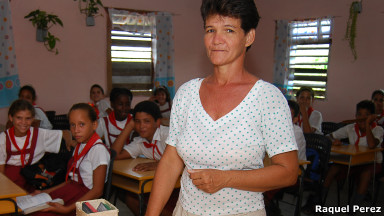Admittedly, it takes skill to write an article of 1400 words about the shortage of teachers and aspiring young teaching careers, not to mention even once the low income they receive in Cuba.
Last year 14,000 teachers left the classroom for requesting medical certificates or licenses this summer and had left school without excuse-other-4000, while 80% of the seats in left vacant teaching careers.
With such a reality and the best juggler could explain the problem omitting to mention the low wages, the great responsibility they take and the amount of work they have since each teacher was required to teach two subjects.
“Juventud Rebelde” gives only a percentage but the fact is that in nearly 13,000 classrooms missing teachers, whose seats are covered by untrained teaching staff, to whom the popular mood has called “instant teachers.”
Readers will note that the paper only reflects the opinion of the Deputy Minister of Education but not once the criteria are reflected in active teacher, who asked for the floor or students who rejected the teaching careers.
It could not just be professional misconduct and the main responsibility is perhaps not journalists but logical result of a structural relationship with the Communist Party newspaper, which did not tolerate self-criticism.
This prevents understanding of the causes of the problems and delineate responsibilities, turning to journalism in a propaganda exercise sterile, unable to assist in the transformations that the Cuban nation today.
Anyway, a newspaper that is considered the voice of young communists should address a topic more strictly linked to one of the most important flags of the Revolution, the nerve center of society and fundamental to youth.
Nobody finds the tree andándose around the bush, it is necessary to get to the root if you want to find solutions and for that we must go back to the days when teaching was no longer a desired profession for college-age youth.
 Moraima Palacios, a school teacher in the province of Pinar del Rio
Moraima Palacios, a school teacher in the province of Pinar del Rio
Find out why thousands of teachers leave schools each year since the economic crisis of the 90s, such as reducing the number affected class size or adding media, that they should look in night shifts.
Remember that they are almost the only sector of the population without income salary, receive no gifts or travel as physicians, can not “solve” as the workers and, while they are active, they can not even give private lessons.
They receive a monthly salary of no more than $ 25 with which to eat the whole month, buy clothes and cleaning equipment to come to school with a good appearance. However, for a pair of shoddy ask them half of what they earn.
I do not really think that one profession that income is to become the dream of young Cubans, however much teaching vocation to be inculcated. The teacher must dignified and the most direct is to pay better wages.
The money spent on education is an investment in Cuba that is checked daily, in fact supports the national economy from the sale of professional services, nothing produces more wealth than the knowledge of the Cubans.
The country could not survive today if a day had not invested in a massive literacy campaign, thousands of doctors in training, over one million professionals and dozens of university research centers with modern technologies.
Since I came to Cuba I was impressed by the development of education, and in particular its mass to be a right for everyone, anyone, regardless of their socioeconomic background, can become a college graduate.
The result is that on that basis the nation today is supported, if there are problems in education in the long run will affect the entire economy. And after 20 years of crisis in the sector, keep repeating the same empty slogans and superficial is irresponsible.
Sources: Cartas Desde Cuba/Fernando Ravsberg/BBC/Uk/ TheCubanHistory.com
Los Maestros que se van/ The Cuban History/ Arnoldo Varona, Editor
LOS MAESTROS QUE SE VAN
Hay que reconocer que se requiere habilidad para escribir un artículo de 1400 palabras sobre la escasez de maestros y de jóvenes aspirantes a las carreras pedagógicas, sin mencionar ni una sola vez los bajos ingresos que perciben estos en Cuba.
El pasado curso 14 mil maestros dejaron las aulas por certificados médicos o solicitando licencias y a mediados de este año habían abandonado la enseñanza -sin excusas- otros 4000, mientras el 80% de las plazas en las carreras pedagógicas quedaron vacantes.
Con semejante realidad ni el mejor malabarista podría explicar el problema omitiendo hablar de los bajos salarios, de la gran responsabilidad que asumen y de la cantidad de trabajo que tienen desde que a cada profesor se le exigió impartir dos asignaturas.
“Juventud Rebelde” da solo un porcentaje pero lo cierto es que en las aulas faltan casi 13.000 educadores, cuyas plazas son cubiertas por personal sin preparación pedagógica, a los que el humor popular ha bautizado como “maestros instantáneos”.
Notarán los lectores que el periódico solo recoge la opinión de la viceministra de Educación pero ni una sola vez se reflejan los criterios de los maestros en activo, de los que pidieron la baja o de los estudiantes que rechazaron las carreras pedagógicas.
Podría no tratarse solo de errores profesionales y la principal responsabilidad tal vez no sea de los periodistas sino resultado lógico de una relación estructural del Partido Comunista con la prensa, en la que no se tolera la crítica por cuenta propia.
Esto impide que se profundice en las causas de los problemas y se delimiten responsabilidades, convirtiendo al periodismo en un ejercicio propagandístico estéril, incapaz de colaborar en las transformaciones que vive hoy la nación cubana.
De todas formas, un medio de prensa que se considera la voz de los jóvenes comunistas debería tratar con mayor rigor un tema ligado a una de las más importantes banderas de la Revolución, punto neurálgico de la sociedad y fundamental para la juventud.
Nadie descubre el árbol andándose por las ramas, es necesario llegar a la raíz si se quiere encontrar soluciones y para eso hay que remontarse a los tiempos en que la docencia dejó de ser una profesión deseada por los jóvenes en edad universitaria.
 Moraima Palacios, maestra de una escuela de la provincia de Pinar del Río.
Moraima Palacios, maestra de una escuela de la provincia de Pinar del Río.
Averiguar por qué miles de maestros abandonan cada año las escuelas desde la crisis económica de los 90, como los afectó la reducción del número de alumnos por aula o la incorporación de medios audiovisuales, que ellos mismos debían cuidar en guardias nocturnas.
Recordar que son casi el único sector de la población sin más ingreso que el salario, no reciben regalos ni viajes como los médicos, no pueden “resolver” como los obreros y, mientras estén en activo, ni siquiera pueden dar clases particulares.
Reciben un salario mensual no mayor de US$25, con el cual deben comer todo el mes, comprar ropa e implementos de aseo para acudir a la escuela con un buen aspecto. Sin embargo, por un par de zapatos de mala calidad les piden la mitad de lo que ganan.
Realmente no me parece que una profesión con ese ingreso llegue a convertirse en el sueño de los jóvenes cubanos, por mucha vocación docente que se les inculque. El magisterio debe dignificarse y la vía más directa consiste en pagarles mejores salarios.
El dinero dedicado a la educación es una inversión y en Cuba eso se comprueba diariamente, de hecho la economía nacional se sostiene de la venta de servicios profesionales, nada produce más riquezas que los conocimientos de los cubanos.
El país no podría sobrevivir hoy si un día no se hubiera invertido en una campaña masiva de alfabetización, en formar miles de médicos, más de un millón de profesionales universitarios y decenas de centros de investigación con modernas tecnologías.
Desde que llegué a Cuba me impresionó el desarrollo de la educación, su masividad y en particular que sea un derecho de todos, que cualquiera, sin importar su procedencia socioeconómica, pueda convertirse en un graduado universitario.
El resultado es que sobre esa base se soporta hoy la nación, si hay problemas en la educación repercutirán a la larga en toda la economía. Y tras 20 años de crisis en el sector, seguir repitiendo las mismas consignas vacías y superficiales es una irresponsabilidad.
Sources: Cartas Desde Cuba/Fernando Ravsberg/BBC/Uk/ TheCubanHistory.com
Los Maestros que se van/ The Cuban History/ Arnoldo Varona, Editor



 Letters From Cuba: The teachers that are leaving * Cartas Desde Cuba: Los maestros que se van.
Letters From Cuba: The teachers that are leaving * Cartas Desde Cuba: Los maestros que se van.